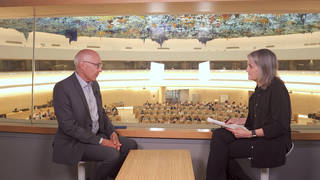
Topics
A Pentagon audit finds that Halliburton overcharged the U.S. government by as much as $61 million for gasoline delivered to Iraq. We go to Basra to speak with CorpWatch’s Pratap Chatterjee about Iraqi reconstruction and the more than 10,000 private military contractors on the ground in Iraq. [Includes transcript]
A Pentagon investigation has found evidence that a subsidiary of Halliburton Company overcharged the U.S. government by as much as 61 million dollars for gasoline delivered to Iraq. Halliburton subsidiary, Kellogg, Brown and Root, delivers fuel to Iraq under huge no-bid reconstruction contracts that have a potential value of $15.6 billion. Separately, Pentagon officials said they rejected a proposal submitted by KBR for cafeteria services that was inflated by 67 million dollars.
The allegations of overcharging are not the first against the company, which has billed the Army for questionable expenses in the past. Halliburton did not appear to have profited from the overcharging, but had instead paid a subcontractor too much for the gasoline in the first place. The company denied overcharging and called the inquiry a “routine audit.”
Halliburton’s former CEO is Vice President Dick Cheney. He still receives about $150,000 in annual deferred payments from the company.
Rep. Henry Waxman, a California Democrat who has been a leading Congressional critic of the contract, said, “Halliburton has been gouging taxpayers and the White House has been letting them get away with it.”
Separately, the weekly newsletter Inside the Pentagon is reporting that Deputy Defense Secretary Paul Wolfwoitz has placed highly restrictive rules on a newly formed inspector general’s office at the Coalition Provisional Authority in Iraq. The office was created to watch out for all manner of waste, fraud, abuse and price gouging by the CPA.
The Halliburton audit came as President Bush worked to justify his decision to bar non-coalition countries from competing for primary reconstruction contracts in Iraq.
Bush said, “It’s very simple. Our people risk their lives. Coalition, friendly coalition folks risk their lives, and, therefore, the contracting is going to reflect that.” The president added that he might issue exemptions for those countries that write off Iraq’s debt.
When told Chancellor Gerhard Schroeder’s said that “international law must apply here,” Bush responded, “International law? I better call my lawyer. I don’t know what you’re talking about, about international law.”
- Pratap Chatterjee, managing director of CorpWatch.org. He joins us on the phone from Iraq where he just arrived in Basra from Baghdad today.
Transcript
AMY GOODMAN: But first, we’re going to take a look at the 10,000 military contractors in Iraq. A pentagon investigation has found evidence that a subsidiary of Halliburton Company charged the U.S. government by as much as — overcharged them by as much as $61 million for gasoline delivered to Iraq. Halliburton subsidiary, Kellogg, Brown & Root delivers fuel to Iraq under huge no-bid reconstruction contracts that have a potential value of $15.6 billion. Separately, pentagon officials said they rejected a proposal submitted by KBR for cafeteria services that was inflated by $67 million.
JUAN GONZALES: The allegations of overcharging are not the first against the company, which has billed the Army for questionable expenses in the past. Halliburton did not appear to have profited from the overcharging, but had instead paid a subcontractor too much for the gasoline in the first place. The company denied overcharging and called the inquiry a, “routine audit.” Halliburton’s former CEO, of course, is Vice President, Dick Cheney. He still receives about $150,000 in annual deferred payments from the company. Representative Henry Waxman, a California democrat, who has been a leading congressional critic of the contract says, quote, “Halliburton has been gouging taxpayers, and the White House has been letting them get away with it.” Separately, the weekly newsletter Inside the Pentagon is reporting that Deputy Defense Secretary, Paul Wolfowitz, has placed highly restrictive rules on a newly-formed Inspector General’s office at the coalition provisional authority in Iraq. The office was created to watch out for all manner of waste, fraud abuse and price gouging by the coalition provisional authority.
AMY GOODMAN: The Halliburton audit came as President Bush worked to justify his decision to bar non-coalition countries from competing for primary reconstruction contracts in Iraq. In perhaps the most direct connection he’s made between business and war, the president said, quote, “It’s very simple, our people risked their lives. Coalition-friendly folks risked their lives, and therefore, the contracting is going to reflect that. The president added he might issue exemptions for those countries that write off Iraq’s debt. This comes as former Secretary of State, James Baker is set to leave on Monday on a five-day trip to negotiate with other countries to forgive Iraq’s debt. Pratap Chattergee is on the line with us right now from Baghdad, he is managing director of Corpwatch.org. Welcome to Democracy Now!.
PRATAP CHATTERGEE: Amy, thank you. I’m actually in Basra, not too far from the Kuwait border, but I was in Baghdad yesterday. And somebody actually sneaked me into the Al Rasheed Hotel, where I visited the Kellogg, Brown & Root cafeteria which had been shut down. I met with some of the workers there, and it’s interesting, that particular cafeteria, there was a restaurant that employs about 60 South Asians, mostly Pakistanis, but also Bangladeshis and Indians, and pays three dollars a day. So it’s quite astonishing that the company says it’s costing them so much money when, in fact, the workers are getting none of that money at all. And tomorrow, in fact, I’ll be visiting the oilfields that Halliburton is now running. [inaudible] when you look [inaudible], the people here are queuing up for gasoline sometimes for days—lines stretching half a mile, or more than that, a mile for gasoline. While Halliburton is trucking in gasoline from Kuwait, Summer, which is a state oil and marketing organization, which promotes the export and import of oil, they bring in gasoline here to sell to the Iraqis in the lines at 98 cents a gallon, whereas Halliburton has been charging as much as $2.50, approximately, on average for gasoline—in some cases as much as $3.09. You mentioned the report says that Halliburton hasn’t profited out of it, but I would like to point out that at the end of the year, once the final bill is paid, Halliburton can then ask for profit of up to 9% from the government. And if the government determines that Halliburton has done a good job, then they pay them — the cost for gasoline will in those cases go up to as much as $3.30 a gallon. So they still stand to profit out of it unless congress, the GAO or somebody reins them in. And the gasoline is just the tip of the iceberg. I mean, other than providing catering services, they set up the tents. They ferry the prisoners — all of the Ba’athist prisoners here that are held, some 15,000 of them, are basically transported back and forth by Kellogg, Brown & Root, which is a subsidiary of Halliburton. The reason they’re spending so much money is because — they’re practically — several of their employees have been killed, and they’re mortally terrified. So they hire very expensive security guards to protect them. And depending on where you are, if you are an Iraqi security guard, you get as little as $100 a month, whereas if you are an American engineer, you get as much as $1,000 a day to work for the company. So, I went to the Sheraton the other day where something like ten floors of the hotel is taken up by Halliburton employees. And if you try to go to any of those floors your way is blocked by a private mercenary, a guard hired through a group called Armorgroup, also the company that protects a number of the, sort of, military facilities out there. The people they hire to do this are, [inaudible], people from Nepal, former members of the British Army. They pay them $1,300 a month. So you cannot enter these spaces because Halliburton, you know, is — you know, terrified of the reaction of ordinary Iraqi citizens, [inaudible] that especially there is [inaudible] for ten hours a day there’s no telephone. Water is difficult to obtain. The sewage system doesn’t work. And so while people are being paid $1,200 a day to work for Halliburton…
JUAN GONZALES: Pratap, I’d like to ask you in terms of the subcontractors and the employees of the subcontractors, clearly you mention they’re south Asians and others who are being — who are employees, but are you able to tell what percent or what portion of these employees that are working over these approximately 10,000 private contractors are American? And also what the subcontracting companies, that supposedly Halliburton gave all of this windfall money to, where those companies are from?
PRATAP CHATTERGEE: It’s a whole variety. So, for example, the company that hires the south Asians is actually a company called Tamini which is based in Saudi Arabia. They subcontract a lot of south Asian labor that’s already in Saudi Arabia and Kuwait, but in some circumstances bring people over from the subcontinent. Where I am in Basra right now, a lot of the local Iraqi labor is subcontracted through a company set up by an American who has come here and basically run the little operation out of here. So, the big money goes to the very wealthy American managers who travel around in GMC Suburbans with military escorts up and down the country. But, for example, in the main convention center, the green zone, the republican palace, a lot of workers there are Iraqis. If you — it’s really hard to get an estimate of the total 1,800 employees that are working for Halliburton, how many are Iraqi, but I believe — I mean, quite a large percentage would be Iraqi and would be paid very low wages.
AMY GOODMAN: We are talking to Pratap Chattergee, who is in Basra right now. I’m looking at a piece that came out of The Guardian saying that private corporations have penetrated western warfare so deeply that they’re now the second biggest contributor to coalition forces in Iraq after the Pentagon. While the official coalition figures list the British as the second largest contingent, with around 9,900 troops, they’re narrowly out-numbered by the 10,000 private military contractors now on the ground. We only have a minute, Pratap, but you’ve been looking at some of these military contractors. What’s their role in Iraq? Ten thousand of them?!
PRATAP CHATTERGEE: Well, they’re really, sort of, the middle management. They, kind of, run the [inaudible] in the country. And this is the problem. I mean, Newsweek called this an $87 billion mess, and it is a mess because the money that’s been spent over here, which could have benefited the local communities, is actually going to benefit, you know, fat cats back in Houston and Washington, D.C. The tragedy is that America, if it wants to take over this country, will lose that backing simply because of the sheer greed of people like Dick Cheney and companies like Halliburton.
AMY GOODMAN: The Guardian investigation said the proportion of contracted security personnel in the firing line is ten times greater than during the first Gulf War. In ’91, for every private contractor there were about 100 service men and women. Now there are ten.
PRATAP CHATTERGEE: Absolutely correct. And there are a lot of people that are — there’s probably two dozen security companies out here. There are companies like Global Risk. There are companies like Erinys. Erinys, for example, is a company that’s contracted to guard the oil fields. And the company, Erinys, is relatively new. It’s set up by South African Businessmen. But these are the same people that ran and trained the Colombian police that guard VP’s and pipelines in Latin America, which have been guilty of human rights abuses. So what they’re basically going out and doing is recruiting people, some of them directly from the old Iraqi army, some from as far away as Nepal and Fiji, and then giving them six week training courses and putting them in the front lines and protecting the American soldiers that are behind that.
AMY GOODMAN: Well, Pratap Chattergee, I want to thank you very much for being with us—Pratap Chattergee of Corpwatch.org. He right now is in Basra. He is traveling through Iraq. You are listening to Democracy Now!. We’ll be back in a minute.













Media Options